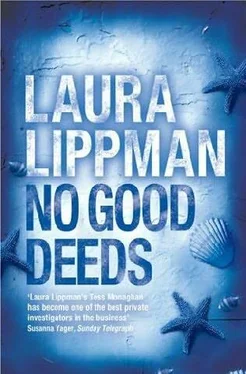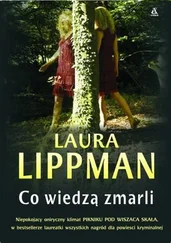But she believed in the wrong thing, she had chosen the wrong side, and that was reason enough to dismantle her life.
“Ocean’s hell on paint and wood,” Edward Keyes said, handing out scrapers and brushes to Crow and Lloyd. “Ocean’s hell on everything, corrosive as a sonuvabitch. I usually paint in the fall, but my Mexican crew up and quit on me.”
“Do you have to stereotype them by race?” Crow said automatically, then regretted it. They were dependent on this man’s generosity, after all.
“What I’d say? Just said they quit, and they did. Left me high and dry last fall, and now I’m way behind if I’m gonna open for Mother’s Day weekend. I should give up on shingles, go with something more mod-ren I know, but I like the old-timey look. It’s not as much work as it looks to be, not once you get a rhythm.”
Lloyd, who had glared at Edward Keyes throughout his overview of the seasonal preparation required by Frank’s FunWorld, spoke for the first time. “Why Frank?”
“What?”
“Your name ain’t Frank. So why this place called that?”
“Sounds better, don’t you think? Allitter-something.”
“Alliteration,” Crow put in, and the other two regarded him as if he were the nerdiest kid in the class.
“Had a cat named Frank once. Mean old tom. By the way, you’ll want to get as much painting done as you can in the morning. Wind kicks up in the afternoon something fierce. That’s why I usually do it in the fall.” And with that, Edward Keyes left them, whistling a happy tune.
Crow supposed that he would be cheerful, too, if he were dispensing the supplies for this backbreaking work, then retiring to the sheltered interior of the park to tinker with the rides and reassemble the Whac-A-Mole games, with a radio to provide some mental distraction. Crow and Lloyd remained outside on this bright, windswept day, with nothing but their own companionship. Which could have been pleasant, but the only conversation Lloyd seemed capable of was a litany of complaints.
“Why we got to paint? We’re paying our way, aren’t we? You givin’ him cash for our food and our rooms, which ain’t much. So why we got to work ?”
“What else are we going to do with our time?”
“I don’t know. Watch TV and shit. Anything but this.”
“What would you be doing back home, a day like today?”
“Find some action. Hang.” Lloyd made a few desultory passes with the paintbrush. “Why can’t we use a roller at least? Go a lot faster.”
“Roller won’t cover shingles. We’ll be able to use it on the concrete, though, on the other side. And when we get to that part, it will seem so easy it won’t be like work at all.”
“Were you a teacher?”
Crow was flattered. “No, but it interests me. I think sometimes of going back to school, getting a certificate.” Only how would I explain to Tess that I could afford it?
“Yeah, that sounds like teacher shit.” Lloyd pitched his voice high and took on a bright, prissy tone. “‘Really, it’s not that hard, boys and girls, if you just try .’ That kind of thing. They was always saying shit like that.”
“Was there anything you liked about school?”
“It was warm,” Lloyd said pointedly. “They didn’t make us stand outside in the cold, painting shit.”
“Look, if we talk, pass the time, this will go a lot faster.”
“I got nothing to talk about with you. Seems to me talking is what got me here.”
“Here” was actually beautiful in its way, a short, old-fashioned stretch of boardwalk in the town of Fenwick, just above the state line and Maryland ’s far-busier resort, Ocean City. The early-spring light, the empty beach, the careworn buildings-they made Crow’s fingers itch with the desire to paint again, although not in this way, applying coats of latex to the battered surfaces of Frank’s FunWorld.
“World” was a little grandiose for this bunkerlike rectangle that contained one bank of Skee-Ball machines, several video machines, a single Whac-A-Mole, and a couple of booths for the hand-eye coordination games that spit out tickets good for schlocky items at the so-called Redemption Center. The rides were geared toward small fry for the most part-little motorcycles that went ’round and ’round, little boats that went ’round and ’round (although their basin was dry), and a ringless, currently horseless merry-go-round. The only concession to anyone above age ten was a bumper-car ride, with the obligatory You Must Be This Tall sign. They would have to paint that, too, Mr. Keyes had said. That and the clown’s face. Well, Crow had just complained to Kitty that he never got to paint anymore.
“No, I mean we could just talk talk . About life. Or movies and books. What do you like?”
“I like them dinosaur books and movies,” Lloyd said. “ Jurassic Park .”
“Michael Crichton. So you like futuristic plots, science fiction.”
Lloyd made a face, but Crow decided it was the word “science” that was putting him off.
“You liked Minority Report , right?”
“The one with the Top Gun dude?”
“Yeah, sure. Anyway, the guy who wrote that also wrote this one called Do Androids Dream of Electric Sheep? , which they made into a Harrison Ford movie. Bladerunner .”
“ Bladerunner ’s a better title.”
“Maybe.” Crow began with bounty hunter Rick Deckard and his mood organ, his argument with his wife, Iran, whose name confused Lloyd no end. Crow’s memory was shaky at first, and he sometimes conflated film and book, but slowly the beloved story came back to him in detail, almost every sentence intact.
Once the mix-up over Iran ’s name was cleared up, it wasn’t apparent if Lloyd was listening. Then he asked a question about midway through, a clarification of some plot point. Other than that, he was quiet and thoughtful. The wind seemed to settle down and the sun grew stronger, so the work wasn’t quite as hard on their exposed hands. Before they knew it, they had finished scraping and painting most of the shingles.
“That guy write any other stories?”
“A few,” Crow said.
When the wind kicked up as predicted and they had to suspend painting for the day, Crow prevailed on Edward to come to the library with them. He was paranoid enough to want to avoid using his own card to check out materials, even if it turned out that Delaware and Maryland had some sort of reciprocity agreement between their library systems. A silver-haired volunteer with an accent that reminded Crow of his Virginia roots showed them the library’s books-on-tape, which included several unabridged editions. With the tapes running up to twelve hours, they couldn’t get through more than two in a week of work, and it was hard for Crow to imagine they would be in this limbo much longer than that. He encouraged Lloyd to make one of the selections. Lloyd picked Stephen King’s The Stand , despite Crow’s subtle lobbying for The Girl Who Loved Tom Gordon . “No girls,” Lloyd had said. Crow chose Robert Parker’s Early Autumn , then picked up several books as well-Chester Himes, Walter Mosley, Elmore Leonard’s Rum Punch , which Lloyd seemed to find mildly intriguing after being assured it was the basis for Quentin Tarantino’s Jackie Brown .
“That was kind of conspicuous,” Edward Keyes said when they were back in Fenwick, sitting down to a lunch of warm soup and grilled cheese sandwiches, made on the hot plate in Frank’s office. Crow had considered his own appetite remarkable until he watched Lloyd consume four sandwiches, three glasses of sweet tea, and most of the Utz chips in under ten minutes.
Читать дальше












